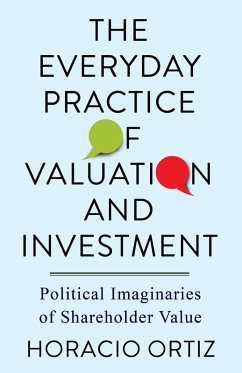The financial industry derives its legitimacy through the claim that it acts in the interest of shareholders. A vast international network of funds, banks, insurance companies, brokerages, rating agencies, and regulatory agencies defends its status by asserting that market mechanisms determine a company's true value and therefore enriching shareholders contributes to the socially optimal allocation of capital. Is this how stock prices are determined in practice? What does stock valuation reveal about the supposed efficiency of markets and what it means to act on behalf of shareholders?
Horacio Ortiz provides a critical analysis of the social institutions and practices that produce and regulate stock pricing and valuation. He examines how financial professionals evaluate and invest in listed companies, unraveling the contradictory definitions of financial value that shape their behavior. Ortiz demonstrates how ideologically laden notions of investing skill and efficient markets are central to the everyday practices of financial valuation, as well as how they function to justify the broader system. He scrutinizes the technical aspects of valuation and investment, their place in social relations within and among companies, and their relation to state regulation in order to demystify how the financial industry presents prices as truths that the rest of society must accept.
Drawing on ethnographic fieldwork conducted among stock brokers and investment management companies in New York and Paris, this book shows how the political imaginaries that underpin financial markets are central to producing, sustaining, and legitimizing global inequalities.
Horacio Ortiz provides a critical analysis of the social institutions and practices that produce and regulate stock pricing and valuation. He examines how financial professionals evaluate and invest in listed companies, unraveling the contradictory definitions of financial value that shape their behavior. Ortiz demonstrates how ideologically laden notions of investing skill and efficient markets are central to the everyday practices of financial valuation, as well as how they function to justify the broader system. He scrutinizes the technical aspects of valuation and investment, their place in social relations within and among companies, and their relation to state regulation in order to demystify how the financial industry presents prices as truths that the rest of society must accept.
Drawing on ethnographic fieldwork conducted among stock brokers and investment management companies in New York and Paris, this book shows how the political imaginaries that underpin financial markets are central to producing, sustaining, and legitimizing global inequalities.
Dieser Download kann aus rechtlichen Gründen nur mit Rechnungsadresse in A, D ausgeliefert werden.









